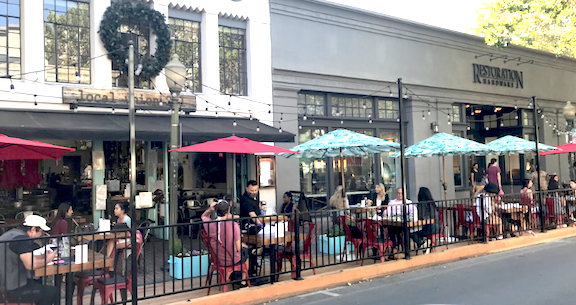
BY KYLE MARTIN
Daily Post Staff Writer
The Palo Alto City Council wants to find a way to fill more than 50 vacant storefronts because of closures caused by the coronavirus lockdown. Council members are thinking about changing the definition of retail in the zoning code to allow banks, law offices and medical practices to occupy ground-floor spaces that previously were limited to stores and restaurants.
“We are recognizing that we are still in a state of emergency,” City Manager Ed Shikada told the council Monday night. “We have a business community and a community at large that is struggling and many of whom, quite frankly, … will not make it through this pandemic.”
The council voted unanimously to extend street closures on California and University avenues to allow restaurants and retailers to operate outdoors in order to follow Covid restrictions.
Council voted 4-3 to have the city’s Planning and Transportation Commission submit to council an ordinance that broadens the definition of the type of retail allowed in the vacant storefronts. Tom DuBois, Lydia Kou and Eric Filseth voted no.
DuBois, Kou and Filseth are part of the slow-growth minority on council. That bloc will become the majority next year with the addition of Greer Stone, who was elected to council last week, and the departures of Adrian Fine and Liz Kniss, who were on the pro-development side of the council spectrum. That means it’s possible that any changes council is pursuing now might be reversed next year.
In a report to the council, Shikada asked members to consider temporarily relaxing parking quotas for retail stores to stave off more closures.
“The pandemic is resulting in closures of many retailers, creating vacancies in Palo Alto,” Shikada wrote to the council. “Vacancies can become a downward spiral; vacancies decrease the attractiveness or draw of an area, which results in diminished consumer traffic, which can lead to diminished sales that leads to further vacancies.”
And Palo Alto will likely allow different businesses deemed by the city to be “compatible with retail and retail-like uses” to operate out of vacant storefronts, the council decided. These businesses include medical offices, adult schools, banks and credit unions, law firms, accountants, real estate agents and others.
Some residents told council they oppose efforts to boost retail traffic, claiming there is not a problem with businesses surviving the pandemic.
“I believe it’s a true myth that retail, the brick-and-mortar places particularly, (are) somehow dying,” said Terry Holzemer, a member of the slow-growth group Palo Altans for Sensible Zoning. “I believe nothing could be more untrue.”
Jessica Roth, owner of The Cobblery at 410 California Ave., told council she supports the extension of street closures on her street for restaurants, “however we do need to also be thinking about our small retailers that are getting lost.”
She said if medical offices and lawyers fill some of these vacancies, it could change the culture of the neighborhood.
Another public speaker, musician and actor Jonathan Erman, said he doesn’t think the council has included all the city’s businesses, such as its artists, in its efforts to save downtown and California Avenue.
“Nowhere in this do I hear any mention of anything regarding music performances or the performance arts theater in our city, which is a major part of Uplift (Local, formerly called Summer Streets), which is a major part of the economy, which is a sector which has essentially been shut down,” Erman said. “And I don’t see any of this discussion from our civic leaders, even as you bend over backwards to allow restaurants to function.”
But Mayor Adrian Fine said he supported the idea of allowing different kinds of businesses to move into vacant storefronts, saying it will help new members elected last week transition to the council.
“If this project proves successful, and our businesses are able to improvise and provide comfort and warmth to folks through the next four or five months, I think that will give next year’s council and staff some really good information,” Fine said.
And Councilwoman Liz Kniss said she wants the city to move expeditiously to get this project going and keep local businesses open.
“If they are going to invest what they need to invest to stay open, we should invest in letting them stay open until next May,” Kniss told the council. “I think it’s going to change their outlook enormously if they think they’re going to be shutting down in January.”
Councilwoman Alison Cormack said the council will need to implement widespread rapid coronavirus testing services in order to have the safest shopping and dining experiences.
“I understand it’s expensive right now to do the rapid testing, but that is what’s going to be required for us to reopen all kinds of things, whether it’s events or services or just plain work places,” Cormack said.




Once these offices take retail spaces, they’ll never let them go. This is the beginning of the end of retail in Palo Alto. The city needs to require more retailers to open up. Maybe hefty fines will do the trick.
Council should be thinking longterm because the coronavirus won’t be going away. Now that Trump is gone, the Democrats will slow down the distribution of the vaccine. For instance, Gov. Newsom plans to have his own panel of experts test the vaccine before it is distributed in California. That will delay it for months. I’m sure the Biden administration will do the same thing. So instead of this pandemic ending in March or April, plan on it lasting until 2022. That means the street closures will become more or less permanent. It also means that small businesses on the edge right now will definitely fail. Terry Holzemer ought to talk to any small business owner to find out what the challenges of staying open are. His comments were uniformed, to say the least.
I watched last night’s meeting and I wish this story would have addressed the proposal by Town & Country to allow medical offices — and offices in general — to fill empty spaces in that shopping center. I don’t want T&C to turn into an office park. It’s fine if T&C has medical offices on the second floor, but not on the ground floor. That changes the character of that area entirely. Council needs to turn thumbs down on that idea.
Don’t worry, with the politics of California that are only amplified on the Peninsula, there will soon be more empty stores than anyone can count.
Maybe we ought to bring back that Palo Alto tourism bureau —- remember that council scam to put city money into the pockets of a well-connected Palo Altan and a local media company, and it did absolutely nothing for the hotels, restaurants or the economy?